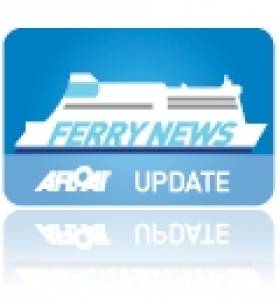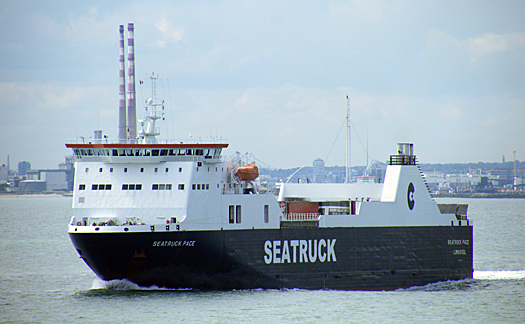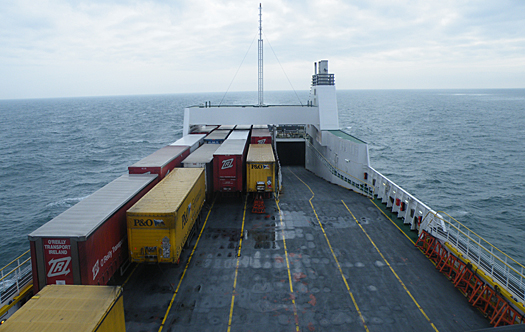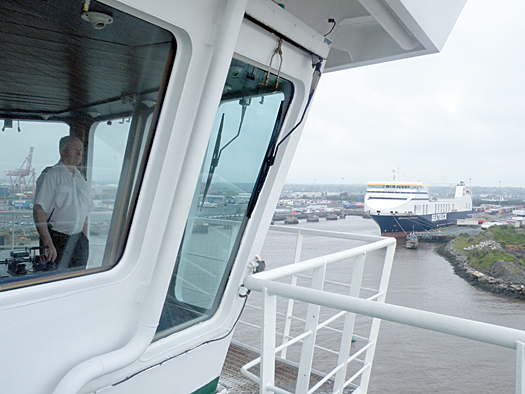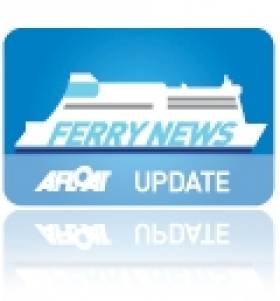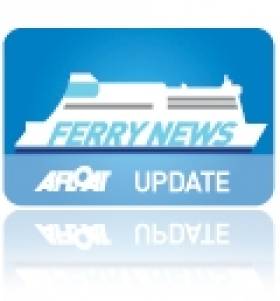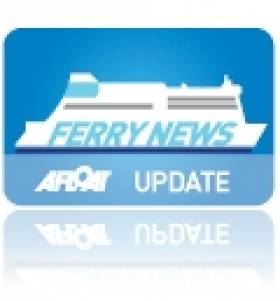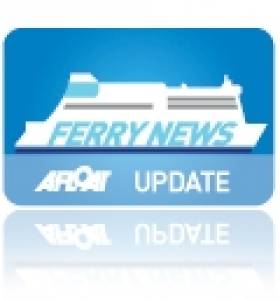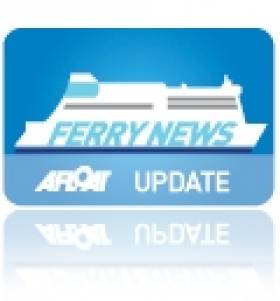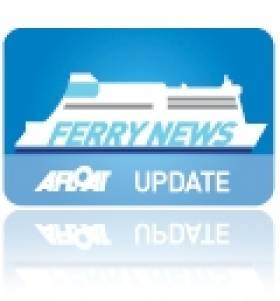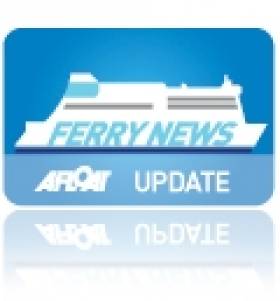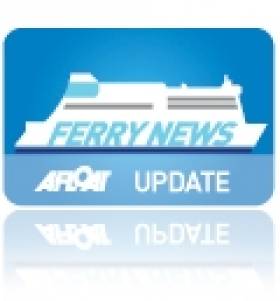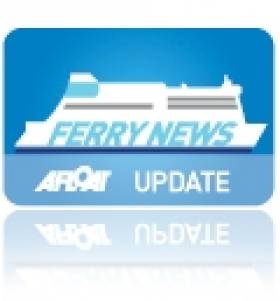Displaying items by tag: Seatruck Ferries
#FerryCaptainInterview - Starting from last weekend is our new series of interviews with Irish Sea ferry captains. Jehan Ashmore talks to Captain Phil Ankers, master of Seatruck Ferries 'P' class ferry freight, Seatruck Pace which in late April entered service on the Dublin Port-Heysham service.
The larger 110 trailer-unit vessel replaces a smaller vessel on the route linking the capital and Lanchashire port. Her introduction also brings enhanced facilities for driver-accompanied trucks on the eight hour Ireland-UK link and offering 16 weekly departures to meet the demands of hauliers.
Before her recent return to Irish Sea, the vessel built as one of a quartet for Seatruck Ferries, had been chartered to Bluwater Shipping A/S to transport wind-farm components from Esbjerg in Denmark for the construction of the Gwynt y Môr Offshore Wind Farm off north Wales.
What set your interest to choose a seafaring career?
There had been seafaring in the family but it skipped a generation with my father, before him there had been two generations of marine engineers!
Name the colleges and or academies to where you studied seamanship courses?
For first certificate (2nd Mates) I studied in Riversdale College in Liverpool then for mates and masters, I studied in Liverpool Polytechnic.
Did any of these educational institutions involve using a training ship? or a stint of service on board a vessel as part of the programme module?
To get 2nd Mates you required 18 months sea service so we had 2 x 6-months in college and the rest spent at sea.
Seatruck Pace on her morning sailing departing Dublin Bay bound for Heysham in Lancashire
Upper-deck of the 110 freight-unit (2,930 lane metres) larger 'P' class vessel which was introduced on the Irish Sea route in late April
What was the most interesting and also the most challenging aspect of your studying?
Ocean fleets traded worldwide so there was a good variety of interesting runs. Star sights were probably the more satisfying part, learning all law and construction was challenging.
For what reasons did you like a career in deep-sea and what ship was the most rewarding?
At the time you could go away to see the world as you had a little port time and shore-leave to do so. My first voyage to the Far East on 'Ascanus' then 'Glenlyon' were very good.
How many un-accompanied trailers can be handled (types of cargo) on the freight decks?
In total there are 116-trailers or 10 trucks and 12 self-drives (cars or lorries).
Since refurbishment upgrade, what facilities have improved for truck ferries and private motorists?
These Point ('P' ) class ships have offered very good facilities since launch, having private cabins with own-shower's +T.V. in addition a good drivers' mess lounge. The new FSG class of the 'Power' and 'Progress' are now much improved as they have privacy curtains and no bunk beds.
What nationalities make up the crew and how many are there in total between change of rosters?
On here we have 3, masters are British, chief officers are Estonian and all other ratings are also of the same nationality. In total we have 40 members of crew.
On average what is the speed of the vessel on the Irish Sea route?
Around 15 knots, the ship can achieve up to 20 knots but we average approximately 15 knots for economy service.
In terms of fuel, what capacity is consumed on each passage and how often do you need to take on bunkers?
The vessel consumes between 9 and 16 tonnes depending on one or two engine passages.
How often do you go on leave while your fellow counterpart relieves you on duty?
We work 2 weeks on 2 weeks off and this changes to 3 on and 3 off during the summer months.
What aspects do you enjoy the most on the freight-only service?
I have enjoyed passenger runs as well but we can give a more one-to-one service on this route for our 12 passengers, which can be for driver-accompanied trucks, private car motorists and those taking motorhomes.
How well suited is this ro-pax on the route and her sea-keeping handling?
This vessel is well suited to Irish Sea conditions.
Captain Phil Ankers on the bridge approaching berth at Dublin Port and a 'FSG' class ship serving Seatruck's route to Liverpool
Seatruck Ferries Introduce Larger P-Class Vessel on Dublin-Heyshem Service this Sunday
#LargerSeatruckShip – Seatruck Ferries introduction of a larger P-class ro-ro freight-ferry on Dublin-Heysham route as previously reported on Afloat.ie, can now be revealed as the 110-unit Seatruck Pace that enters service this Sunday, writes Jehan Ashmore.
Seatruck Pace replaces R-class 65-unit vessel Arrow and with the launch of the larger ro-ro vessel brings increased levels of comfort for truck-drivers. Notably, single-berth cabins on the Irish Sea route between the Irish capital and Lancashire in the north-west of England.
The introduction of Seatruck Pace reaches to three of the quartet of P-class ships serving in the Irish Sea. She joins the pair that also operate from Heysham on the company's second Lancashire link to Warrenpoint.
Final member of the P-class, leadship Clipper Point, remains chartered on a North Sea service with DFDS Seaways. The third route also operated by Seatruck Ferrries is Dublin-Liverpool served by a pair of their largest fleet ships the 150 unit FGS class.
Arrow will continue to have an Irish Sea role as the vessel is to be chartered on long-term to the Isle of Man Steam Packet Company to boost freight capacity on the Heysham-Douglas route.
#LargerSeatruckShip – Seatruck Ferries will be launching a larger 'P' class 14,000 tonnes freight vessel on the Dublin Port-Heysham route later this month, writes Jehan Ashmore.
The much larger capacity vessel with space for 110 units will replace the 65 unit Arrow which is currently operating on the route linking the Irish capital and the North Western English port in Lancashire.
As previously reported on Afloat.ie, the Arrow is to be chartered to the Isle of Man Steam Packet Company to boost freight capacity on the Douglas-Heysham route later this month.
In addition the larger Seatruck 'P' class vessel when introduced on the Dublin-Heysham route will also bring increased speed, schedule reliability and change of ships confirms the company's long-term commitment and strategic importance to the route.
The larger 110 unit vessel includes greater trailer free height and a faster turnaround time in port. The ship also benefits from a ramp interface to the lower hold instead of a lift. Drivers will also have use of single berth cabins and a comfortable lounge.
The Dublin - Heysham route provides an additional option for Seatruck customers, as the dedicated freight operator also operates the Dublin - Liverpool and Warrenpoint - Heysham routes.
The introduction of this larger vessel on the Dublin-Heysham will be the third P-class sister operating for Seatruck from the UK port.
The final P class series ship, Spanish built Clipper Point, which is the leadship of a quartet, remains on charter to DFDS Seaways operating Immingham - Cuxhaven route.
Returning to the Irish Sea, where Seatruck operate over 50 weekly departures and for details of the freight company's Easter Schedule, visit this link to download sailing schedule.
Seatruck Ferries Refit Cabins on Liverpool Route Sisters
#CabinRefit -Passengers travelling on Seatruck Ferries Dublin-Liverpool freight ro-ro vessels Seatruck Power and Seatruck Progress, the final pair from an original quartet of 'Heysham-Max' newbuilds, have now the added convenience of two single beds on ground level.
No longer will drivers have to climb to share a bunk bed facility. Added privacy has been gained with the benefit of a folding curtain which can be pulled along the centre of the cabin to separate the two beds. New carpets were also fitted to add a final finish to the refit.
The refit Seatruck say is to enhance passenger privacy and bring a more personal touch to the overall passenger experience.
Seatruck is primarily a freight-carrier, operating Dublin-Liverpool, Dublin-Heysham and Warrenpoint-Heysham. However, they cater for a limited number of passengers travelling with their cars or motorhomes. For more details visit this link.
Seatruck Ferries Ship-Snapping Competition
#PhotoCompetition – Seatruck Ferries, an Irish Sea ro-ro freight-ferry operator is running a picture competition with a chance of winning £250 worth of high-street vouchers of your choice.
The company which won the Irish Sea Sea Shipping Line of the Year at last year's Export & Freight Transport & Logistics Awards, has a network of three routes, Warrenpoint-Heysham, Heysham-Dublin and Dublin-Liverpool. In recent year's Afloat.ie has reported on the introduction of a quartet of 'Heysham' max newbuilds.
The company which also caters for a limited number of motorist-passengers, are inviting the public to get snapping with the ship picture competition, where the topic must feature one of their ro-ro freight-ferries.
So get snapping, it's a great way of getting your pictures noticed as previous photographic entries are posted online. They may be even published in the next addition of the Seatruck newsletter. For Seatruck photo gallery, competition details and conditions click this link.
Get Snapping! Seatruck Ferries Photo Competition
#PhotoCompetition – Seatruck Ferries, are currently running a photo competition to win £250 worth of vouchers of your choice.
Participants are asked to take a photograph that must be that of a Seatruck vessel, nature or theme. Entries for the competition maybe published in the next edition of the Seatruck newsletter. For further details and how to enter visit this link.
As previously reported on Afloat.ie, Seatruck Ferries were awarded 'Irish Sea Shipping Line of the Year' at the Export & Freight Transport & Logistics Awards held in September.
I.O.M. Steam Packet Company Secure Charter of Seatruck Freighter
#NEWManxFreighter – In a move to further consolidate freight-service operations, the Isle of Man Steam Packet Company has chartered Seatruck Ferries R-class ro-ro freighter Arrow (1998/7,606grt) on a long-term basis, writes Jehan Ashmore.
The agreement includes an option to purchase the 84-truck trailer capacity vessel should this be necessary. The charter of Arrow provides the Isle of Man Steam Packet Company with a long-term back-up for its vital freight services, as well as guaranteed additional capacity to help grow the TT Races and Isle of Man Festival of Motorcycling.
With the introduction of Arrow, the additional freight comes at a time when Ellan Vannin Line, as previously reported on Afloat.ie, a new Manx based shipping company aim to introduce a rival freight service to the UK mainland in the first quarter of 2014.
According to the Ellan Vannin Line website, they also plan to start a IOM-UK ro-ro ferry service in readiness for the TT Races next year. Currently the IOM Steam Packet Company are the only operator of all passenger services that link ports to Heyham, Belfast, Dublin, Liverpool and Birkenhead.
Chief Executive Mark Woodward of the Steam Packet said: "MV Arrow is one of a class of vessels ideally suited to Steam Packet Company needs and the services we provide. Vessels which are suitable for operation in all weathers and at all states of tide in both Douglas and Heysham harbours are now becoming increasingly scarce. In recent years it has proven difficult to charter vessels for the short period necessary to either cover the Ben-my-Chree overhaul or simply to provide extra capacity at TT."
Mr. Woodward added: "In the short-term the charter will allow certainty in planning for the scheduled biennial overhaul of Ben-my-Chree in April 2014. It will also enable us to plan ahead and to devote the Ben-my-Chree fully to visitor traffic for next year's TT event, while the MV Arrow provides a bespoke and uninterrupted service for our freight customers."
Chairman Robert Quayle concluded: "We have been concerned for some time now at the falling number of suitable vessels available to us on the charter market. As a result of the recently announced debt reduction, the Steam Packet Company is now well placed to be able to implement key strategic developments for the future."
The company's main vessel the ro-pax ferry Ben-my-Chree. The 12,504 tonnes ferry has been the island's workhorse having provided 15 years of loyal service since introduction in 1998 primarily on the Douglas-Heysham route.
She also operates during Bank Holiday periods running sailings on the seasonal-only route to Dublin, with the balance of summer crossings covered by fast-craft Mannanan. Next month she is to resume operating winter-only sailings on the route to Birkenhead (Liverpool).
In those 15 years of service Ben-my-Chree has carried the equivalent of the Island's population 45 times over and enough freight to reach from Douglas to Birkenhead and back more than 20 times.
The sixth company vessel to carry the name Ben-My-Chree, has carried around 3.9 million passengers, 1.1 million cars, 250,000 motorcycles, and more than 100,000 vans and trade cars.
Freight is measured in metres in which her vehicle decks total 1,235 lane metres and it is estimated she has carried 6.2 million metres of freight. She has moved approximately 500,000 freight trailers which has involved carrying everything from food to space capsules.
She has provided a vital link for the Isle of Man Island all year round, with an exemplary reliability record of 97.8% since January 2010.
The £25m Ben-My-Chree was custom-built built by the Dutch yard of Van der Giessen de Noord shipyard in the Netherlands, for the 'Steam Packet' which claims to be the oldest continually operating passenger shipping company in the world, having begun operations in 1830.
Seatruck Ferries Voted Irish Sea Shipping Line of the Year
#SeatruckAWARD – This year's Irish Sea Shipping Line of the Year is Seatruck Ferries, the award was presented at the Export & Freight Transport & Logistics Awards held in Belfast.
The much coveted award, sponsored by DSV was presented at a ceremony held at the Ramada Hotel.
Hauliers were asked to anonymously pick one service which offered the optimum level of service, quality, on-board facilities and choice of routes.
The votes were registered via a totally secure and carefully policed on-line 'one customer one vote' system. The results were counted and the winner was the shipping line that received the most votes.
Those watching the awards ceremony heard, 'this award is all about what the customer thinks and hauliers have voted for a company that has grown substantially over the last decade and a half, not only in size of fleet but in the quality of a service that has successfully filled a gap in the market for a freight operation serving Ireland.'
One customer waived anonymity and added to his vote the following: "Seatruck are a long way in front of their competition, with customer services, co-operation, a willingness to help, treating customers like family and letting you know that they want you rather than need you; a great all round shipping company, in a league of their own."
With 16 categories the awards are organised by Hillsborough based publishers of Export & Freight magazine, 4SM (NI) Ltd.
The event is widely regarded as the premier event in the Irish transport and logistics calendar, attracting entries, support and sponsorship from leading players in the industry.
Seatruck Ferries Gain MLC Compliance Certification
#SeatruckFerries – Irish Sea freight-only ro-ro operator Seatruck Ferries, whose ship management team have had a busy summer as an important new part of marine law has been rolled out.
The Maritime Labour Convention, 2006 or MLC, 2006 is an international labour Convention adopted by the International Labour Organization (ILO). It provides international standards for the world's first genuinely global industry.
Widely known as the "seafarers' bill of rights," the MLC, 2006 was adopted by government, employer and workers representatives at a special ILO International Labour Conference in February 2006.
It is unique in that it aims both to achieve decent work for seafarers and to secure economic interests through fair competition for quality ship owners.
The Convention is comprehensive and sets out, in one place, seafarers' rights to decent working conditions. It covers almost every aspect of their work and life on board.
Seatruck's entire ro-ro fleet has now gained MLC certification recognising the company's on-going commitment to crew welfare.
The freight operator specialises in un-accompanied trailer traffic (i.e no truck drivers) though there is provision for a limited number of cabins.
Seatruck run three services on routes linking Dublin-Liverpool, Dublin-Heysham and Warrenpoint-Heysham.
As previously reported the company earlier this year had a contract to transport accommodation 'Snoozebox' modules on the route to Warrenpoint for use by security personnel during the G8 summit held on the lakes of Fermanagh.
Each week Seatruck sail more than 50 sailings across this route networkoperating a fleet of 12 modern roll-on roll-off freight ferries.
These vessels range in capacity from 65-150 unaccompanied trailers the vessels are not only operated on the Seatruck routes but also available in the open charter market to other users.
Seatruck Ferries Transport ‘Snoozebox’s for G8 Summit
#FerryNews- Seatruck Ferries Heysham-Warrenpoint route had the unusual task of transporting 170 'Snoozebox' cabins to provide temporary accommodation for the 1350 security personnel drafted in for the G8 Summit that took place on the shores of Lough Erne.
Each cabin houses eight individuals in two rooms, each of which has its own bathroom facilities.
The cabins were moved to a strict timeline with Newry based Motis securing the contract for their transportation to site.
Seatruck Commercial Manager in Ireland Damian McGrath commented: "The movement took a great deal of planning not only to meet the requirements of the contract but also to ensure that our regular customers were not disadvantaged by this large movement.
Mr McGrath added "Many of the shipments were undertaken on weekend and off peak sailings where space could be made available more easily. The Warrenpoint route is having a busy year with more and more users switching to the service".
Two freight ferries run the route linking between Co. Down and Cumbria, they are the Seatruck Panorama (2008/14,759grt) and the chartered Anglia Seaways (2000/13,073grt).



























